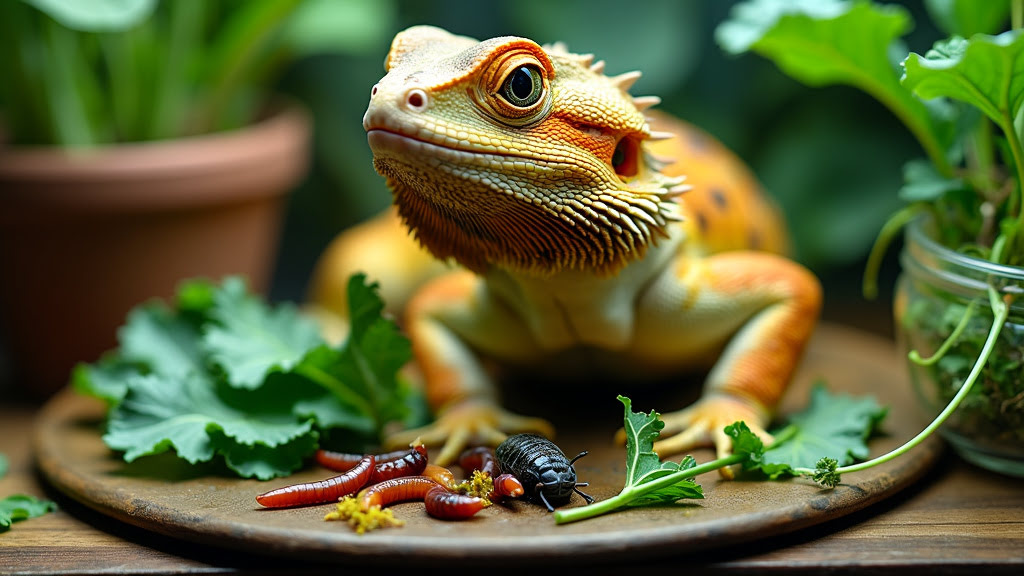Bearded dragons are a top choice among people who love exotic pets. With their friendly personalities and interesting behaviors, it’s easy to see why so many have fallen for them. But to keep these cool reptiles happy and healthy, they need a balanced diet. Today, we’re going to find out: Can bearded dragons eat Swiss chard? Stay with us as we explore the leafy green world of Swiss chard and what it means for your scaly friend.
Overview of Bearded Dragon Diet
General Dietary Needs
Bearded dragons are omnivores, which means they eat both plants and insects. This mix is important for their health because it gives them a variety of nutrients. It’s like inviting your dragon to a buffet rather than giving them the same meal every day.
Staple Foods
Primary Vegetable Options
Some of the best vegetables for bearded dragons are collard greens, mustard greens, dandelion greens, and squash. These veggies are the foundation of their diet and provide important vitamins and minerals.
Recommended Insects and Proteins
For the protein part of their diet, popular choices include crickets, dubia roaches, and mealworms. Younger dragons need more protein, while adults eat more veggies. It’s like growing from a meat-loving kid to a healthy, balanced adult.
What Is Swiss Chard?
Nutritional Profile
Swiss chard is a leafy green vegetable packed with vitamins A, C, and K, as well as minerals like magnesium, potassium, and iron. It’s a nutritional treasure chest for those who eat it.
Common Usage in Human Diets
People often use Swiss chard in salads, soups, and sautés, enjoying its slightly earthy and bitter taste. Because of its popularity, pet owners might think about adding it to their bearded dragons’ diet too.
Can Bearded Dragons Eat Swiss Chard?
Nutritional Suitability for Bearded Dragons
Swiss chard has its good points for feeding your dragon. Vitamins A, C, and K can help with their immune system, vision, and bone health. However, be careful. Swiss chard is high in oxalates, which can bind calcium and cause calcium deficiencies. It’s like inviting a friend who talks a lot to a party—fun in small doses but too much can be overwhelming.
Personal Experiences with Feeding Swiss Chard
Some bearded dragon owners have had good experiences adding Swiss chard to their pets’ diets. The dragons often like the taste and get a good amount of nutrition. However, it’s important to feed it in moderation. Too much can lead to digestive problems or more serious health issues.
Positive Outcomes
Feeding Swiss chard occasionally can boost vitality and help some bearded dragons have a healthy, shiny coat. Variety can indeed be the spice of life, even for dragons!
Any Observed Issues or Reactions
On the other hand, some owners have noticed that feeding too much Swiss chard can cause minor digestive issues. It’s important to watch how your dragon reacts after introducing any new food.
Balancing Swiss Chard in a Bearded Dragon’s Diet
How Much and How Often
Recommended Serving Sizes
Swiss chard should be more of a treat than a main food. A small portion, no larger than one leaf chopped into bite-sized pieces, is usually enough.
Frequency of Inclusion in Diet
Aim to include Swiss chard no more than once a week. This way, your dragon can enjoy its benefits without any risks.
Combining with Other Foods
Best Pairings for Nutritional Balance
To balance the high oxalate content, pair Swiss chard with calcium-rich foods like collard greens or dandelion greens. It’s like creating a harmonious meal for your bearded dragon.
Avoiding Dietary Monotony
Mix up the types of greens and insects you offer. This not only keeps your dragon interested but also ensures they get a wide range of nutrients.
Signs of Dietary Issues and When to Consult a Vet
Common Symptoms to Watch Out For
Digestive Issues
Keep an eye out for changes in bowel movements. Diarrhea, loss of appetite, or unusual tiredness could mean something’s wrong.
Behavioral Changes
If your usually active dragon starts lounging around more than exploring, it might be time to check their diet.
Importance of Consulting a Veterinarian
General Advice on Health Concerns
When in doubt, always seek professional advice. Your vet can give tailored suggestions based on your pet’s specific needs.
Preventive Health Measures
Regular vet check-ups can catch diet-related issues before they become serious. It’s like maintaining a car—a little tune-up can go a long way!
FAQs and Common Concerns
Can baby bearded dragons eat Swiss chard?
It’s best to avoid giving Swiss chard to baby dragons because they need more protein and have sensitive digestive systems. Stick to more established, nutrient-rich greens and proteins.
Is organic Swiss chard better?
While organic produce often has fewer pesticides, always wash any vegetables thoroughly before feeding them to your bearded dragon. Rinse, rinse, and rinse again!
How to prepare Swiss chard for bearded dragons?
Rinse the leaves thoroughly, chop them into small, manageable pieces, and serve them raw. No seasoning or cooking needed—your dragon likes it plain.
Other leafy greens to consider
Other good options besides Swiss chard are collard greens, mustard greens, and turnip greens. These provide lots of nutrients and keep your dragon’s diet balanced.
Conclusion
As we finish our leafy adventure, let’s remember the main points: Swiss chard can be good for bearded dragons but should be fed in moderation because of its high oxalate content. A varied diet is key to keeping your dragon healthy.
Try experimenting with new and safe foods while watching your dragon’s reactions. Always consult a vet for any specific dietary questions—they’re the real heroes in keeping your pet happy and healthy.
References and Further Reading
For those who want to learn more about caring for bearded dragons, many books and articles offer detailed advice. Trusted websites also provide up-to-date nutritional guidance, and don’t forget to ask your local exotic pet veterinarian for help.
Remember, at Dug’s Bugs, we’re here to ensure your bearded dragon eats well and lives even better!

